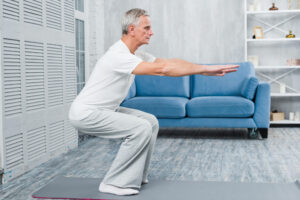Yoga, traditionally seen as a peaceful and introspective practice, often carries a stigma when associated with men. This stigma stems from a myriad of misconceptions and societal norms that suggest yoga is not “masculine” enough.
Historically, physical activities for men have been dominated by competitive and strength-oriented sports. Yoga, with its focus on flexibility, mindfulness, and inner peace, clashes with these traditional ideas of masculinity that prioritize physical prowess and stoicism over emotional expression and self-care. This cultural backdrop can make it challenging for men to approach or embrace yoga without fear of judgment or ridicule.
The shift in attitude
Attitudes towards men practicing yoga are changing, largely due to increased awareness of the holistic benefits of yoga and a broader cultural shift towards gender neutrality in health and wellness practices.
As mental health and well-being become more openly discussed, men are beginning to see yoga not just as a form of physical exercise, but as an essential component of overall health.
Benefits of yoga for men
Yoga offers a wealth of benefits that are particularly advantageous for men, addressing both physical and mental health needs. Physically, yoga enhances flexibility, a crucial element often overlooked in traditional male fitness routines which focus more on strength and endurance. Improving flexibility through yoga not only aids in muscle recovery but also reduces the risk of injuries, making it an excellent complement to other forms of exercise. This is one of the reasons why you should look for gyms with yoga classes.
Strength is another significant benefit. Contrary to common misconceptions, many yoga poses require and build substantial muscular strength, particularly in the core, back, and shoulders. Additionally, yoga improves posture and alignment which can alleviate common pains like backache, a frequent issue for men who might spend hours in office environments.
On the mental health front, yoga is a powerful tool for stress reduction. The practice’s focus on deep breathing and mindfulness helps to calm the mind, enhance concentration, and reduce the symptoms of anxiety and depression. These mental health benefits are critical in today’s fast-paced world, where psychological stressors can impact overall health.
How to get started with yoga
For men new to yoga, beginning a practice can seem daunting amidst a plethora of styles and prevailing stereotypes. However, getting started is simpler than it might appear.
The first step is to choose a beginner-friendly class that allows you to learn the basic poses and breathing techniques in a supportive environment.
If you are looking for beginner-friendly yoga classes in Brunswick, then get your 3-day free pass at HiTone Fitness to start your journey.
You should also invest in the right equipment—such as a yoga mat, comfortable clothing, and possibly a few props like blocks or a strap—which can also help enhance your initial experiences. Additionally, it’s beneficial to set realistic goals and expectations to maintain motivation without feeling overwhelmed.
Choosing the right style
Yoga comes in various styles, each offering different benefits and experiences. For those looking for a more vigorous workout, styles like Ashtanga, Vinyasa, or Power Yoga are ideal as they are more dynamic and physically challenging. These styles focus on movement synchronized with breath and can be a great cardiovascular workout.
If relaxation and stress relief are more of what you are seeking, styles like Hatha or Iyengar Yoga might be more suitable. These practices focus more on precise alignment and slower movements, providing room to explore each pose deeply.
For those interested in the meditative aspects of yoga, Kundalini Yoga combines specific poses with chanting, singing, and meditative focus, which can be a powerful spiritual and physical experience.
Final thoughts
The increasing participation of men in yoga is a positive trend that reflects a broader shift towards holistic health and gender neutrality in wellness practices. Yoga offers a unique combination of physical and mental benefits that are particularly beneficial to men, helping them not only enhance their physical fitness but also manage stress, improve mental clarity, and achieve better overall well-being.







